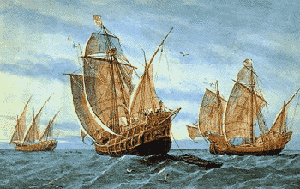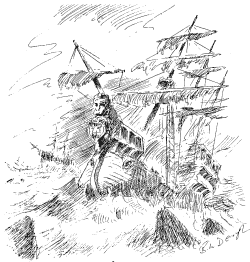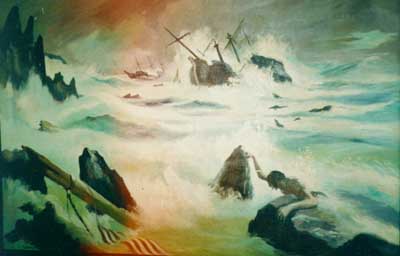
On that wild day when near our coast
the stately ships of Spain,
Caught in a fierce and sudden storm,
for safety sought in vain.
The Coming of Cuellar
By TP Kilfeather
On that wild day when near our coast
the stately ships of Spain,
Caught in a fierce and sudden storm,
for safety sought in vain.
For four days the great ships had strained at their anchors at that point of the coast which is dominated by the squat bulk of Benbulben mountain. "On the fifth day," wrote Captain Cuellar, "there came a great tempest which took us on the quarter, with a sea running as high as the Heaven, so that neither could our hawsers stand the strain nor could the sails be of any service. The ships were driven ashore on a beach of fine sand, and in the space of an hour the three vessels went to pieces. Of their crews, not more than 300 escaped, while more than 1,000 were drowned, among them many noblemen, chief officers, gentlemen and other persons and all their suites.
 "Don Diego Enriquez, the
hunchback Major-General, met his death in a most miserable manner. Frightened by the heavy
seas which were running and which passed clear over the ships, he took to a small boat
which had a deck. Along with him went the son of the Count of Villafranca and two other
Portuguese gentlemen, having on their persons jewels and coin to the value of 16,000
ducats. Having stowed themselves beneath the deck, they ordered the hatch to be closed and
caulked. As they were casting off, more than seventy desperate sailors and soldiers threw
themselves into the boat. At that moment the small boat was struck by an immense wave
which completely covered it and carried away all these people, and then the boat went
whirling about in the heavy sea until it was cast ashore, keel upwards and in such a
condition that the gentlemen who were in the small shelter deck beneath the hatch died
there.
"Don Diego Enriquez, the
hunchback Major-General, met his death in a most miserable manner. Frightened by the heavy
seas which were running and which passed clear over the ships, he took to a small boat
which had a deck. Along with him went the son of the Count of Villafranca and two other
Portuguese gentlemen, having on their persons jewels and coin to the value of 16,000
ducats. Having stowed themselves beneath the deck, they ordered the hatch to be closed and
caulked. As they were casting off, more than seventy desperate sailors and soldiers threw
themselves into the boat. At that moment the small boat was struck by an immense wave
which completely covered it and carried away all these people, and then the boat went
whirling about in the heavy sea until it was cast ashore, keel upwards and in such a
condition that the gentlemen who were in the small shelter deck beneath the hatch died
there.
"Then came along some savages who turned the boat over in order to strip it of iron fittings and nails. Breaking open the hatch, they took out the dead bodies and stripped them, taking all the money and jewels that they found on them, and after that they threw the bodies aside without any attempt whatsoever at burial. From the stern of the ship I looked at the pitiful scene that lay before me, many being drowned in the vessel, others throwing themselves into the raging sea and sinking without again coming to the surface, others calling aloud for help and imploring God’s aid.
"I knew not what to do, not knowing how to swim and the waves being great. On land there was the shore lined with enemies who were dancing and jumping around with joy at the sight of our misfortune, and when anyone of our people reached the shore, down on him they came and at once stripped him of every stitch he had on him and then ill-treated him and left him covered with wounds.
 "I
went to the aid of Martin de Aranda and I found him very woebegone and miserable. I asked
him what he wished to do to save his life before the vessel had finished breaking up,
saying that she would not hold together more than a quarter of an hour, as in truth, she
did not. Already the greater part of the crew, as well as the captain and officers, had
been either drowned or killed when I resolved on making an effort to save my life. I
therefore got on a hatch or a piece of the hull which had been broken off and Martin de
Aranda followed me, loaded as he was with escudos which he carried sewn up in his doublet
and hose. The piece of wreckage, however, would not come away from the hull, being bound
to it by heavy chains, while the heavy seas and much floating timber beat so against it as
to cause us great pain. I sought out, therefore, some other mode of rescue which was to
throw myself on a hatch about the size of a table, which seemingly by the Mercy of God,
had been brought within my reach. I sought to get on it, but down I went some six good
fathoms and took in so much water that I was almost drowned. Coming again to the surface,
I called to Martin de Aranda and was able to get him on to the hatch with me.
"I
went to the aid of Martin de Aranda and I found him very woebegone and miserable. I asked
him what he wished to do to save his life before the vessel had finished breaking up,
saying that she would not hold together more than a quarter of an hour, as in truth, she
did not. Already the greater part of the crew, as well as the captain and officers, had
been either drowned or killed when I resolved on making an effort to save my life. I
therefore got on a hatch or a piece of the hull which had been broken off and Martin de
Aranda followed me, loaded as he was with escudos which he carried sewn up in his doublet
and hose. The piece of wreckage, however, would not come away from the hull, being bound
to it by heavy chains, while the heavy seas and much floating timber beat so against it as
to cause us great pain. I sought out, therefore, some other mode of rescue which was to
throw myself on a hatch about the size of a table, which seemingly by the Mercy of God,
had been brought within my reach. I sought to get on it, but down I went some six good
fathoms and took in so much water that I was almost drowned. Coming again to the surface,
I called to Martin de Aranda and was able to get him on to the hatch with me.
"As we cleared ourselves of the ship and were getting away from her, there came an immense wave which struck us with such force that Martin de Aranda, not being able to hold on, was swept away and drowned, crying aloud for help, and calling on God as he disappeared. It was now out of my power to aid him since the hatch, being now unloaded at one extremity, started to turn over with me, while at the very same moment a piece of floating timber almost broke my legs.
"I, therefore, with great resolve, got firmly fixed on the hatch, calling for help to Our Lady of Ontanar. Just then there came in quick succession four waves, and without knowing how, and unable as I was to swim, I was carried to land where I got out of the water unable to stand up and covered with blood, wounds and bruises."
Captain Cuellar crawled to a point from which he could see the beach. From his hiding place the sight which met his eyes was, indeed, horrifying. "I saw," he wrote, "more than 800 corpses which the sea had thrown up on the shore. The ravens and the wild dogs fed on them without anyone being there to give them burial – not even to poor Don Diego Enriquez."
A little under a century ago, a great storm shifted some of the tall sand dunes. There, revealed by the wind, were the bones of scores of men who had found their last resting place in Ireland in 1588- the year of the Armada.
Read Captain Cuellar's Diary
Mystery of a Missing Figurehead
Sensational Find at Streedagh
Nealon aims for Special Armada Museum for Sligo
Armada Survey at Streedagh
Completed